10 july 2017
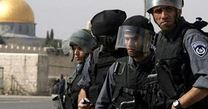
The Israeli authority has escalated over the past month its collective punishment policy against Palestinians in occupied Jerusalem, the Wadi Hilweh Information Center said in its monthly report.
The report stated that four Jerusalemite youths were killed by Israeli gunfire in June while 126 others were arrested during the same reported period.
Three Jerusalemites aged between 18 and 19 were killed on June 16 by Israeli police while a 23-year-old young man was shot and killed in a separate incident on June 20 for alleged anti-occupation attacks.
The four dead bodies are still held in Israeli morgues as Israel continues to refuse handing over two other slain Jerusalemites’ bodies since last October.
On the other hand, the report revealed that 1,339 Israeli settlers broke into al-Aqsa Mosque over June via the Israeli-controlled al-Magharibeh gate.
The Israeli break-ins into the Mosque had notably intensified during the last ten days of the holy month of Ramadan.
Meanwhile, an employee of the Waqf department was denied access into the holy shrine for a whole month, while four guards of al-Aqsa were summoned for investigation last month.
The monthly report also documented the arrest of 126 Jerusalemites in June including 40 minors, three women, and two old men.
Furthermore, Israeli authorities tightened military restrictions near Bab al-Amoud area for two days in the past month of June following an alleged stabbing attack, preventing West Bankers’ access to al-Aqsa Mosque in the process.
Along the same line, the Israeli police detained four Palestinian citizens, who work as musaharatis (Ramadan predawn drummers or wakers) in the Old City of occupied Jerusalem for several hours before being released on a bail.
Five other Jerusalemite youths were brutally attacked by a group of settlers before Israeli police arrested four of them.
The report stated that four Jerusalemite youths were killed by Israeli gunfire in June while 126 others were arrested during the same reported period.
Three Jerusalemites aged between 18 and 19 were killed on June 16 by Israeli police while a 23-year-old young man was shot and killed in a separate incident on June 20 for alleged anti-occupation attacks.
The four dead bodies are still held in Israeli morgues as Israel continues to refuse handing over two other slain Jerusalemites’ bodies since last October.
On the other hand, the report revealed that 1,339 Israeli settlers broke into al-Aqsa Mosque over June via the Israeli-controlled al-Magharibeh gate.
The Israeli break-ins into the Mosque had notably intensified during the last ten days of the holy month of Ramadan.
Meanwhile, an employee of the Waqf department was denied access into the holy shrine for a whole month, while four guards of al-Aqsa were summoned for investigation last month.
The monthly report also documented the arrest of 126 Jerusalemites in June including 40 minors, three women, and two old men.
Furthermore, Israeli authorities tightened military restrictions near Bab al-Amoud area for two days in the past month of June following an alleged stabbing attack, preventing West Bankers’ access to al-Aqsa Mosque in the process.
Along the same line, the Israeli police detained four Palestinian citizens, who work as musaharatis (Ramadan predawn drummers or wakers) in the Old City of occupied Jerusalem for several hours before being released on a bail.
Five other Jerusalemite youths were brutally attacked by a group of settlers before Israeli police arrested four of them.
23 june 2017
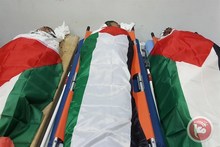
Israeli authorities are set to return the body of a Palestinian who was killed by Israeli forces near Qalandiya checkpoint on Tuesday in the central occupied West Bank district of Ramallah, while the Israeli state has continued to hold the bodies of three other Palestinians who were killed following a deadly attack in occupied East Jerusalem last week.
The Palestinian Committee of Civil Affairs said Friday that Israeli authorities would return the body of 23-year-old Bahaa Imad al-Hirbawi at 3:30 pm on Friday to al-Hirbawi’s hometown of al-Eizariya in the central West Bank district of Jerusalem.
His body will be delivered at a road junction nearby the illegal Israeli settlement of Maale Adumim, the committee said.
Al-Hirbawi was killed at the Jabaa military checkpoint near the illegal Israeli settlement of Adam, close to the infamous Qalandiya checkpoint in Ramallah, after Israeli forces opened live fire on him for allegedly attempting to carry out a stabbing attempt.
However, al-Hirbawi’s family rejected the Israeli army’s version of events as “false claims.”
Members of the family said that Bahaa left home Tuesday afternoon after getting off of work, and said he was going to Ramallah city to shop and visit his brother who lives there.
Relatives cited eyewitness accounts as saying that Israeli forces stopped Bahaa at the Jabaa checkpoint on his way back home from Ramallah and surrounded him. After that, “nobody knows what happened,” they said.
The family said they first heard of Bahaa’s death through social media posts and were officially informed by the Palestinian liaison sometime later.
Israeli forces have been routinely criticized for their excessive use of force and for what rights groups have termed a "shoot-to-kill" policy against Palestinians who did not constitute a threat at the time of their death, or who could have been subdued in a non-lethal manner -- amid a backdrop of impunity for Israelis who committed the killings.
Meanwhile, the Palestinian Committee of Civil Affairs also released a statement on Friday saying that “continuous efforts” were being made to pressure the Israeli authorities to return the bodies of the three slain Palestinians who allegedly carried out a deadly attack at Damascus Gate near the Old City, which left an Israeli police officer dead.
After it was revealed that the three alleged assailants -- Baraa Ibrahim Saleh, 18, Adel Hassan Ahmad Ankoush, 18, and Usama Ahmad Ata, 19 -- were from the occupied West Bank village of Deir Abu Mashaal, the town was subsequently placed under lockdown, and has been subjected to multiple military raids since.
Israeli authorities had taken measurements of the homes of the alleged assailants in preparations for punitive demolitions, which the families had been informed would be carried out “soon.”
According to the Palestinian Center for Human Rights, a total of 22 people, the three men’s family members, will be left homeless by the punitive demolitions in spite of not having been charged with any wrongdoing.
Adel Ankoush’s mother Zeinab was also detained by Israeli forces during a raid on her home. She is expected to be held by Israeli authorities for an additional eight days under suspicions of "supporting a terrorist organization and planning to conduct an attack," according to a statement released Friday by Israeli police spokeswoman Luba al-Samri.
She is also being interrogated for "inciting violence and terrorism," al-Samri added.
Israeli police had also extended the detention of a Palestinian in his fifties from the occupied East Jerusalem neighborhood of al-Issawiya until June 26, for Israeli authorities to conduct more interrogations over suspicions the man had "transported the three terrorists to the area on the day of the attack," according to al-Samri.
Some 250,000 Palestinians who had received family visitation permits to enter Jerusalem and Israel during the Muslim holy month of Ramadan also saw their permits revoked following the attack, while the immediate and extended family of the three alleged assailants had all of their Israeli permits revoked, including long-term Israeli work permits.
Meanwhile, Palestinians said they were subjected to “collective punishment” following the attack through road closures, arbitrary searches, and mass detentions.
Israeli authorities are known to withhold Palestinian bodies from their families for extended periods of time after they have carried out an attack, alleging that funerals of “martyrs” -- Palestinians killed by Israeli forces -- encourage “incitement” against the Israeli state.
However, Palestinians have long claimed that the policy is a form of "collective punishment," targeting the families of actual or alleged Palestinian attackers, while also preventing families of slain Palestinians from requesting proper autopsies on their loved ones, as the bodies returned are often damaged and disfigured.
A case demanding the release of Palestinian bodies still being held by the Israeli state, including Abd al-Hamid Abu Srour, Muhammad Tarayra, Muhammad al-Faqih, Rami Awartani, and Misbah Abu Sbeih -- which have been held for 14 months, 12 months, 11 months, 11 months, and eight months respectively, has been frozen in Israel’s Supreme Court for months.
Israel has also continued to hold the body of Fadi al-Qunbar, although he was not included in the case heard by the Supreme Court.
A joint statement released by Addameer and Israeli minority rights group Adalah in March 2016 condemned Israel’s practice of withholding bodies as "a severe violation of international humanitarian law as well as international human rights law, including violations of the right to dignity, freedom of religion, and the right to practice culture."
The Palestinian Committee of Civil Affairs said Friday that Israeli authorities would return the body of 23-year-old Bahaa Imad al-Hirbawi at 3:30 pm on Friday to al-Hirbawi’s hometown of al-Eizariya in the central West Bank district of Jerusalem.
His body will be delivered at a road junction nearby the illegal Israeli settlement of Maale Adumim, the committee said.
Al-Hirbawi was killed at the Jabaa military checkpoint near the illegal Israeli settlement of Adam, close to the infamous Qalandiya checkpoint in Ramallah, after Israeli forces opened live fire on him for allegedly attempting to carry out a stabbing attempt.
However, al-Hirbawi’s family rejected the Israeli army’s version of events as “false claims.”
Members of the family said that Bahaa left home Tuesday afternoon after getting off of work, and said he was going to Ramallah city to shop and visit his brother who lives there.
Relatives cited eyewitness accounts as saying that Israeli forces stopped Bahaa at the Jabaa checkpoint on his way back home from Ramallah and surrounded him. After that, “nobody knows what happened,” they said.
The family said they first heard of Bahaa’s death through social media posts and were officially informed by the Palestinian liaison sometime later.
Israeli forces have been routinely criticized for their excessive use of force and for what rights groups have termed a "shoot-to-kill" policy against Palestinians who did not constitute a threat at the time of their death, or who could have been subdued in a non-lethal manner -- amid a backdrop of impunity for Israelis who committed the killings.
Meanwhile, the Palestinian Committee of Civil Affairs also released a statement on Friday saying that “continuous efforts” were being made to pressure the Israeli authorities to return the bodies of the three slain Palestinians who allegedly carried out a deadly attack at Damascus Gate near the Old City, which left an Israeli police officer dead.
After it was revealed that the three alleged assailants -- Baraa Ibrahim Saleh, 18, Adel Hassan Ahmad Ankoush, 18, and Usama Ahmad Ata, 19 -- were from the occupied West Bank village of Deir Abu Mashaal, the town was subsequently placed under lockdown, and has been subjected to multiple military raids since.
Israeli authorities had taken measurements of the homes of the alleged assailants in preparations for punitive demolitions, which the families had been informed would be carried out “soon.”
According to the Palestinian Center for Human Rights, a total of 22 people, the three men’s family members, will be left homeless by the punitive demolitions in spite of not having been charged with any wrongdoing.
Adel Ankoush’s mother Zeinab was also detained by Israeli forces during a raid on her home. She is expected to be held by Israeli authorities for an additional eight days under suspicions of "supporting a terrorist organization and planning to conduct an attack," according to a statement released Friday by Israeli police spokeswoman Luba al-Samri.
She is also being interrogated for "inciting violence and terrorism," al-Samri added.
Israeli police had also extended the detention of a Palestinian in his fifties from the occupied East Jerusalem neighborhood of al-Issawiya until June 26, for Israeli authorities to conduct more interrogations over suspicions the man had "transported the three terrorists to the area on the day of the attack," according to al-Samri.
Some 250,000 Palestinians who had received family visitation permits to enter Jerusalem and Israel during the Muslim holy month of Ramadan also saw their permits revoked following the attack, while the immediate and extended family of the three alleged assailants had all of their Israeli permits revoked, including long-term Israeli work permits.
Meanwhile, Palestinians said they were subjected to “collective punishment” following the attack through road closures, arbitrary searches, and mass detentions.
Israeli authorities are known to withhold Palestinian bodies from their families for extended periods of time after they have carried out an attack, alleging that funerals of “martyrs” -- Palestinians killed by Israeli forces -- encourage “incitement” against the Israeli state.
However, Palestinians have long claimed that the policy is a form of "collective punishment," targeting the families of actual or alleged Palestinian attackers, while also preventing families of slain Palestinians from requesting proper autopsies on their loved ones, as the bodies returned are often damaged and disfigured.
A case demanding the release of Palestinian bodies still being held by the Israeli state, including Abd al-Hamid Abu Srour, Muhammad Tarayra, Muhammad al-Faqih, Rami Awartani, and Misbah Abu Sbeih -- which have been held for 14 months, 12 months, 11 months, 11 months, and eight months respectively, has been frozen in Israel’s Supreme Court for months.
Israel has also continued to hold the body of Fadi al-Qunbar, although he was not included in the case heard by the Supreme Court.
A joint statement released by Addameer and Israeli minority rights group Adalah in March 2016 condemned Israel’s practice of withholding bodies as "a severe violation of international humanitarian law as well as international human rights law, including violations of the right to dignity, freedom of religion, and the right to practice culture."
27 may 2017
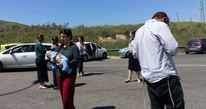
Palestinians in al-Ubaidah town in Bethlehem on Saturday bade farewell to juvenile martyr Raed Radayda after his family had received his body on Friday. The body was detained at the Israeli side for five days.
The funeral march kicked off from Al-Quds University’s Institute of Forensic Medicine and headed to the martyr’s family home, then to the town’s mosque for the funeral prayer.
The juvenile martyr was killed last Monday by Israeli gunfire at the al-Container barrier east of Bethlehem after alleged stabbing attempt.
The funeral march kicked off from Al-Quds University’s Institute of Forensic Medicine and headed to the martyr’s family home, then to the town’s mosque for the funeral prayer.
The juvenile martyr was killed last Monday by Israeli gunfire at the al-Container barrier east of Bethlehem after alleged stabbing attempt.
16 may 2017
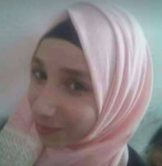
Palestinian Red Crescent Society teams revealed on Tuesday that they were heading to Ofer military barrier west of Ramallah in order to receive the body of the female minor Fatmah Hejaiji who was killed by Israeli gunfire last week.
Israeli occupation authorities (IOA) summoned the family of the female martyr on Monday and told them they were going to return the body of their daughter on Monday, but the IOA postponed that to Tuesday.
The 16-year-old Hejaiji, from Qarawa Bani Zeid town northwest of Ramallah, was hit by 20 bullets fired by Israeli policemen at Damascus gate in Occupied Jerusalem last week. The Palestinian girl was shot after an alleged stabbing attempt.
Israeli occupation authorities (IOA) summoned the family of the female martyr on Monday and told them they were going to return the body of their daughter on Monday, but the IOA postponed that to Tuesday.
The 16-year-old Hejaiji, from Qarawa Bani Zeid town northwest of Ramallah, was hit by 20 bullets fired by Israeli policemen at Damascus gate in Occupied Jerusalem last week. The Palestinian girl was shot after an alleged stabbing attempt.
4 may 2017
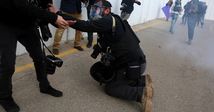
A number of Palestinian activists and journalists were injured on Thursday after Israeli Occupation Forces (IOF) quelled a peaceful march that was organized by Islamic and national factions in Bethlehem city.
The PIC reporter said that the march was organized in solidarity with hunger striking detainees in Israeli jails. The marchers also asks for returning the bodies of martyrs detained by Israeli authorities.
Scores of activists and citizens participated in the event and carried Palestinians flags along with photos of prisoners and martyrs. They chanted slogans in support of the hunger striking detainees.
IOF soldiers showered the participants with tear gas and sound grenades. A number of journalists, including Abdul Hafith al-Hashlamoun, Iyyad Hamad, and Safiya Kuwar, were injured with shrapnel.
The PIC reporter said that the march was organized in solidarity with hunger striking detainees in Israeli jails. The marchers also asks for returning the bodies of martyrs detained by Israeli authorities.
Scores of activists and citizens participated in the event and carried Palestinians flags along with photos of prisoners and martyrs. They chanted slogans in support of the hunger striking detainees.
IOF soldiers showered the participants with tear gas and sound grenades. A number of journalists, including Abdul Hafith al-Hashlamoun, Iyyad Hamad, and Safiya Kuwar, were injured with shrapnel.
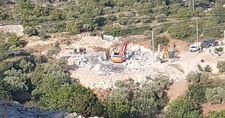
No more than 20 Palestinians attended the funeral of 25-year-old Ibrahim Matar, killed by the Israeli army in mid-March, on Wednesday night.
The Israeli occupation authorities (IOA) released Matar’s body after they closed off all access roads to al-Mujahideen Cemetery, in Bab al-Sahira, in Jerusalem’s Old City, and prevented hundreds of Matar’s family members and friends from marching in his funeral procession.
The IOA released the body of the slain Palestinian youth Ibrahim Matar overnight on conditions that no more than 20 persons attend his funeral, that his family pay 20,000 shekels as a guarantee, and that his body be handed over between 11:00 p.m. and 01:00 a.m.
Matar was killed by the Israeli occupation forces on March 13, 2017, after he was arrested and searched at a police station in Bab al-Asbat, in Jerusalem’s Old City. An Israeli officer fatally shot him on his way out of the detention center on claims that he attempted to carry out a stabbing attack. The family denied the allegations and said their son was heading to al-Aqsa Mosque to perform dawn prayers.
The Israeli police claimed that two officers sustained light-to-moderate injuries in a stabbing attack carried out by Matar.
The IOA further prevented Matar’s family from setting up a mourning tent in Jabal al-Mukabir, the casualty’s hometown.
The bodies of six slain anti-occupation Palestinian youths are still withheld by the IOA.
The Israeli occupation authorities (IOA) released Matar’s body after they closed off all access roads to al-Mujahideen Cemetery, in Bab al-Sahira, in Jerusalem’s Old City, and prevented hundreds of Matar’s family members and friends from marching in his funeral procession.
The IOA released the body of the slain Palestinian youth Ibrahim Matar overnight on conditions that no more than 20 persons attend his funeral, that his family pay 20,000 shekels as a guarantee, and that his body be handed over between 11:00 p.m. and 01:00 a.m.
Matar was killed by the Israeli occupation forces on March 13, 2017, after he was arrested and searched at a police station in Bab al-Asbat, in Jerusalem’s Old City. An Israeli officer fatally shot him on his way out of the detention center on claims that he attempted to carry out a stabbing attack. The family denied the allegations and said their son was heading to al-Aqsa Mosque to perform dawn prayers.
The Israeli police claimed that two officers sustained light-to-moderate injuries in a stabbing attack carried out by Matar.
The IOA further prevented Matar’s family from setting up a mourning tent in Jabal al-Mukabir, the casualty’s hometown.
The bodies of six slain anti-occupation Palestinian youths are still withheld by the IOA.
2 may 2017
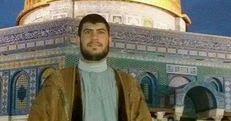
The Israeli occupation authorities (IOA) are expected to release the body of 25-year-old Ibrahim Matar, from Jabal al-Mukbir, in Occupied Jerusalem, on Wednesday.
Lawyer Mohamed Mahmoud, from the prisoners’ and ex-prisoners’ committee, said the IOA will release the body of the slain Palestinian youth Ibrahim Matar on conditions that no more than 20 persons attend his funeral, that his family pay 20,000 shekels as a guarantee, and that his body be handed over between 11:00 p.m. and 01:00 a.m.
Matar was killed by the Israeli occupation forces on March 13, 2017, after he was arrested and searched at a police station in Bab al-Asbat, in Jerusalem’s Old City. An Israeli officer fatally shot him on his way out of the detention center on claims that he attempted to carry out a stabbing attack. The family denied the allegations and said their son was heading to al-Aqsa Mosque to perform dawn prayers.
Lawyer Mohamed Mahmoud, from the prisoners’ and ex-prisoners’ committee, said the IOA will release the body of the slain Palestinian youth Ibrahim Matar on conditions that no more than 20 persons attend his funeral, that his family pay 20,000 shekels as a guarantee, and that his body be handed over between 11:00 p.m. and 01:00 a.m.
Matar was killed by the Israeli occupation forces on March 13, 2017, after he was arrested and searched at a police station in Bab al-Asbat, in Jerusalem’s Old City. An Israeli officer fatally shot him on his way out of the detention center on claims that he attempted to carry out a stabbing attack. The family denied the allegations and said their son was heading to al-Aqsa Mosque to perform dawn prayers.
28 apr 2017
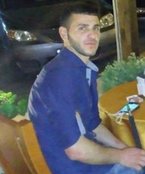
Palestinian Red Crescent Society received from the Israeli occupation forces (IOF) on Friday evening the body of the Palestinian martyr Suhaib Mashahra from Sheikh Saad town in Occupied Jerusalem.
The Society said that its teams transferred the martyr’s body to Makassed Hospital in Occupied Jerusalem.
Mashahra was killed by Israeli gunfire on April 19 at Gosh Etzion military barrier, south of Bethlehem, after an alleged stabbing attempt.
The Society said that its teams transferred the martyr’s body to Makassed Hospital in Occupied Jerusalem.
Mashahra was killed by Israeli gunfire on April 19 at Gosh Etzion military barrier, south of Bethlehem, after an alleged stabbing attempt.
27 apr 2017
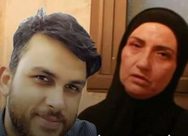
After Israel held her body for 28 consecutive days since the soldiers shot her, and prevented medics from approaching her, eventually leading to her bleeding to death, the corpse of slain Palestinian mother from Shu’fat refugee camp, in occupied Jerusalem, was finally released to her family, and was buried next to her son, who was killed by the soldiers in September of last year.
The Palestinian Red Crescent Society said it received the corpse of Seham Rateb Nimir, 49, from an Israeli military base, in Anata village, and transferred it to her family in Shu’fat refugee camp. She was buried late on Wednesday evening.
Fateh movement spokesperson in Shu’fat refugee camp Thaer Fasfous, said approximately 300 persons participated in the funeral ceremony, after her body was finally sent back home, and marched towards the local council for prayers before burial.
Fasfous added that Seham was buried next to her son, Mustafa Nimir, 27, who was killed in September of 2016, after the soldiers fired a barrage of bullets at his car, calming that her tried to ram them, and later admitted he never tried to attack them.
Seham was killed on March 30th 2017, in Bab al-‘Amoud area, in occupied East Jerusalem, after the soldiers claimed “she carried scissors, and attempted to stab them.” She bled to death after the soldiers prevented medics from approaching her.
The Palestinian Red Crescent Society said it received the corpse of Seham Rateb Nimir, 49, from an Israeli military base, in Anata village, and transferred it to her family in Shu’fat refugee camp. She was buried late on Wednesday evening.
Fateh movement spokesperson in Shu’fat refugee camp Thaer Fasfous, said approximately 300 persons participated in the funeral ceremony, after her body was finally sent back home, and marched towards the local council for prayers before burial.
Fasfous added that Seham was buried next to her son, Mustafa Nimir, 27, who was killed in September of 2016, after the soldiers fired a barrage of bullets at his car, calming that her tried to ram them, and later admitted he never tried to attack them.
Seham was killed on March 30th 2017, in Bab al-‘Amoud area, in occupied East Jerusalem, after the soldiers claimed “she carried scissors, and attempted to stab them.” She bled to death after the soldiers prevented medics from approaching her.
21 apr 2017
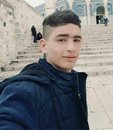
The Israeli occupation forces (IOF) handed over on Friday evening the body of Ahmad Ghazal, 17, from Nablus city three weeks after his martyrdom.
Wasef Ghazal, the martyr's uncle, told the PIC reporter that the family received the body in the presence of the Palestinian Liaison officials at Jit checkpoint, west of Nablus, before it was transferred to a local hospital.
The IOF soldiers executed Ghazal in cold blood after he carried out a stabbing attack on al-Wad Street in the Old City of Occupied Jerusalem on 1st April 2017. Two settlers and one soldier were injured.
Wasef Ghazal, the martyr's uncle, told the PIC reporter that the family received the body in the presence of the Palestinian Liaison officials at Jit checkpoint, west of Nablus, before it was transferred to a local hospital.
The IOF soldiers executed Ghazal in cold blood after he carried out a stabbing attack on al-Wad Street in the Old City of Occupied Jerusalem on 1st April 2017. Two settlers and one soldier were injured.
10 apr 2017
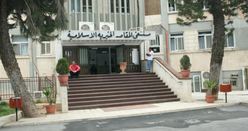
According to Haaretz Israeli newspaper, authorities confessed that they have lost the remains of dozens of Palestinian bodies killed by Israeli forces several years ago.
This was discovered when Israeli prosecution responded to a petition filed by Palestinian families, to the Supreme Court, to return 123 bodies of their relatives; they said they know the location of only two bodies.
Presumably, Al Ray further reports, the number of people whose burial places are unknown is actually far higher: At a High Court session, last month, prosecutors said that, of 123 requests submitted by Palestinian families up to 2015 and included in a different petition, only two bodies had been located.
A number of Israeli legal and military officials say they believe the state has no information about the whereabouts of many of the bodies. In a few cases, the remains had been in Israel’s possession since the 1990s.
The paper added that, “The truth must be told: The traces of some of the bodies have been lost,” said a senior Justice Ministry official, speaking on condition of anonymity. He added that the search for the missing remains, which began only recently, is still going on. “The task right now is to sit all the officials down and decide who’s in charge.”
This was discovered when Israeli prosecution responded to a petition filed by Palestinian families, to the Supreme Court, to return 123 bodies of their relatives; they said they know the location of only two bodies.
Presumably, Al Ray further reports, the number of people whose burial places are unknown is actually far higher: At a High Court session, last month, prosecutors said that, of 123 requests submitted by Palestinian families up to 2015 and included in a different petition, only two bodies had been located.
A number of Israeli legal and military officials say they believe the state has no information about the whereabouts of many of the bodies. In a few cases, the remains had been in Israel’s possession since the 1990s.
The paper added that, “The truth must be told: The traces of some of the bodies have been lost,” said a senior Justice Ministry official, speaking on condition of anonymity. He added that the search for the missing remains, which began only recently, is still going on. “The task right now is to sit all the officials down and decide who’s in charge.”
